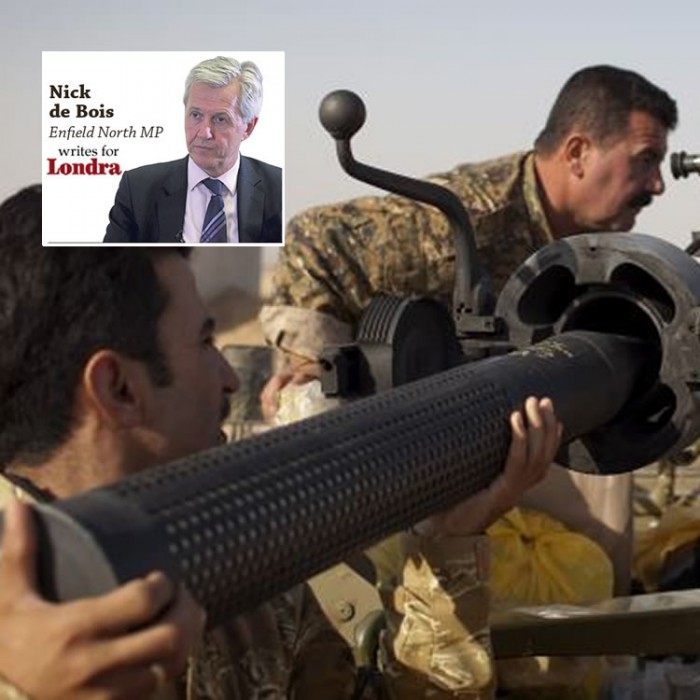Don’t rush to judge Turkey
In a column for Londra Gazete, Enfield North MP Nick de Bois says the circumstances facing Kobane and Syria are complex and challenging
 In a column for Londra Gazete, Enfield North MP Nick de Bois says the circumstances facing Kobane and Syria are complex and challenging
In a column for Londra Gazete, Enfield North MP Nick de Bois says the circumstances facing Kobane and Syria are complex and challenging
The UK’s involvement in conflicts in the Middle East has a chequered history and a tragic cost of lives. The British Parliament, our parliament, has recently been cautious about supporting intervention in conflicts. I myself voted against the 2013 proposed military action against Syria on the grounds that if the military were not convinced of the effectiveness of the proposed operation, or could conceivably predict the outcome of any action then I for one could not vote for military intervention.
But of equal importance at the time was that the proposed action would be one, where yet again, the US and the UK would be taking unilateral action in the Middle East, not allied intervention with substantive support from the region.
Perhaps the only ‘success’ of military intervention was in the first Gulf War when George Bush and the then British Prime Minister the Conservative John Major pulled together a coalition of partners from across the Arab states and around the world to liberate Kuwait from the clutches of the aggressor Saddam Hussein. That coalition survived a conflict transcending regional differences in the Middle East and then went on to provide air cover for Iraqi Kurds and political asylum here in Britain. Something now often overlooked some 20 years on.
Today we face the most serious threat in the form of ISIS, a bloodthirsty horrific regime that recognises no boundaries and has the ability to threaten our safety and security here at home, most immediately in the Middle East. They pose a very clear and present danger. I have no hesitation in supporting Britain’s role to provide air strikes in Iraq, as well as tactical and military advice and equipment to Kurdish and Iraqi forces to help defeat this enemy.
Yet I do so knowing that my constituents demand that we do not lead the fight against ISIS but support a united opposition from NATO and the neighbours of Iraq and Syria. ISIS present an international threat and this requires an international response.
That is why the apparent reluctance of Turkey (and indeed other states) to engage more fully in the military action leaves some constituents rightly asking if once again the weight of responsibility will fall on western allies to settle another Middle East conflict.
Yet before rushing to judgment it’s important to note that Turkey is providing (and has been doing so since long before the tragedy of Kobane) extraordinary humanitarian aid to more than 1.5 million refugees. That’s roughly equal to having five London boroughs such as Enfield, Camden, Brent, Haringey and Islington dropped on your doorstep.
In addition the Turkish Consul General not unreasonably pointed out in this newspaper last week that his country’s southern border have accommodated almost 200,000 Kurds of Syrian origin in less than a week to ward off the humanitarian catastrophe caused by the onslaught of ISIS on Kobane. We should not dismiss this lightly; few countries could respond to such a challenge.
This crucial support is recognised by the British public who have a deep sense of understanding of what is right and what is wrong, but are not all necessarily engaged in the complex and challenging circumstances facing Turkey when called to do more.
Some quite simply expect Turkey to do more and believe that the political leaders’ initial caution in the wake of Kobane was an error. But I welcome the steps in the last few days to ease the passage of fighters across their border and stem the threat of ISIS recruits trying to get from Turkey into the battle zones. This is crucial in assisting the Kurdish (and let’s not forget others including the Yazedi) people who are vulnerable to the atrocities of ISIS across the region.
There are very challenging difficulties and understandable fears from Turkey’s politicians that increased military engagement means supporting the Kurdistan Workers’ Party (PKK), and further, that putting troops on the ground when other NATO forces are not doing so increases their risk of wider conflict escalation for Turkey for years. Given the proximity of the fight this is something that Turkey may ultimately have to do, but arming and supporting the PKK is presently an unrealistic expectation from the West.
However, Turkey came close to securing an accommodation with the Kurdish population and the PKK before, and surely it must work hard to help secure a political settlement again so that it can engage wholeheartedly with NATO in what promises to be a long and difficult campaign against the threat of ISIS not just in the Middle East but across the globe. Any sense of delay, or political brinkmanship on either side would be inexplicable where in fact the threat of ISIS should act as an incentive.
ISIS is as brutal as it is complex: fighting across borders, inhuman, without moral foundation and without doubt a substantial threat at home and abroad. To succeed against them we need to work together with our allies.









